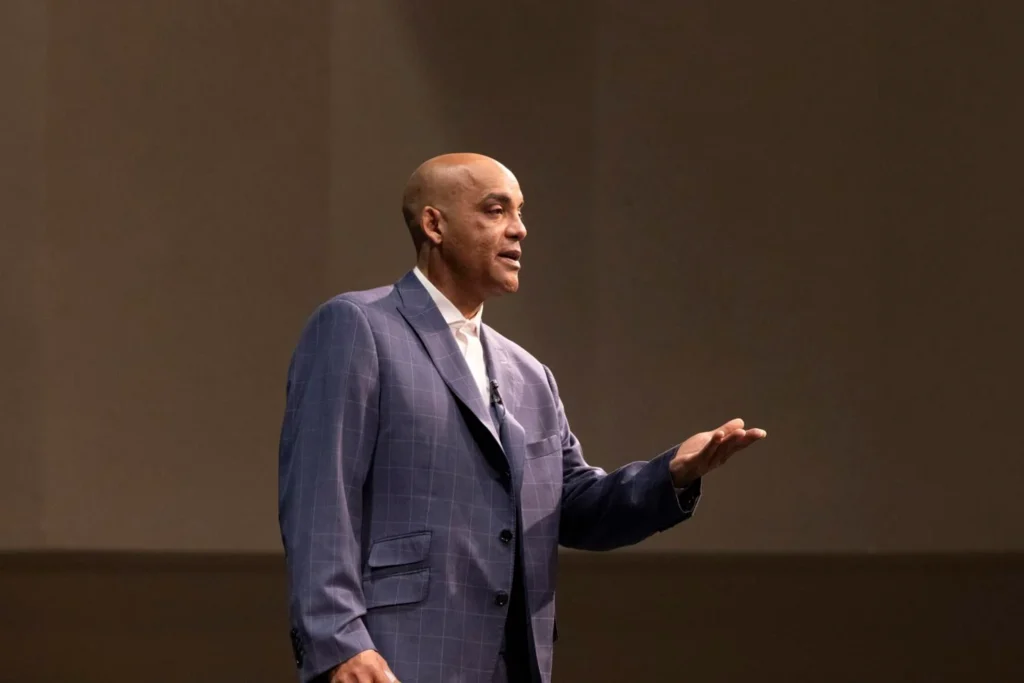VIA Atlantic City Press –

At an Opioid abuse education program, former Rutgers and NFL quarterback Ray Lucas addressed an assembly of approximately 300 students in grades 9-12 at the Performing Arts Center of Middle Township on Thursday, Dec. 5, 2024, answering a question during a Q+A with students, letting them know if they get injured in sports, to take the time they need to heal, rather than be exposed to his story, which was to take pain medication to enable him to continue his participation in the NFL.
Matthew Strabuk – Atlantic City Press Staff Photographer
CAPE MAY COURT HOUSE — Ray Lucas choked up for a brief moment Thursday.
The former NFL and Rutgers University quarterback told his story of overcoming opioid addiction to 400 student-athletes in a Knock Out Opioid Abuse event at the Performing Arts Center at Middle Township.
“When it comes back, the emotions come back with it,” said Lucas, who spoke to Middle Township High School and Middle School students. “But, I think, the more real I get with these kids, the message gets received 10 times better.”
Lucas played for eight seasons in the NFL, including four with the New York Jets. Throughout his professional and college careers, he overcame a life-threatening opioid addiction due to prescription pain medication from injuries he suffered as well as the multiple surgeries he underwent.
Since 2022, Lucas has been giving back by informing young athletes about the dangers and risks of opioid abuse. Thursday was his 16th event with student-athletes.
“When I was at my worst, I received a gift of sobriety,” the 52-year-old Harrison, Hudson County, native said. “I don’t know how to put it but, to me … if I get one of those kids in that room to listen to my story and think they can beat it, I win, dude. We win. As a group, we win.”
The presentation opened with a video, which featured Lucas, Rutgers football coach Greg Schiano, New Jersey State Interscholastic Athletic Association Executive Director Colleen McGuire and others, urging athletes to reach out for help in understanding prescription medications or if they are having trouble with opioids.
Other guests spoke, including Cape May County Prosecutor Jeffrey H. Sutherland.
Lucas was blessed with a gift growing up — being able to succeed at multiple sports. He loved playing basketball just as much as football, and even scored 2,000-plus points at Harrison High School. Despite not getting a scholarship for his top sport, he did get to play football at Rutgers.
That led to his first of 33 surgeries, including neck, back and knee operations.
“After a while, I was taking 82 pills per day, enough to kill this section right here,” Lucas told the students, pointing to the center of the auditorium. “But God kept me here for a reason.”
The reason?
“To tell you to not be afraid to ask for help,” Lucas said. “Asking for help is not a weakness.”
But, even now, he is unsure why he is still here. He just knows talking about it helps others and himself stay strong.
“That’s the crazy part because I really don’t know,” Lucas said. “I am still trying to figure that part out, but I know I feel good when I do it. Not just just for the give-back, but it’s almost therapy for me, too. To speak about something you overcome, it gives you a little boost, too.”
“I think this issue is really overlooked, so I am glad we got to learn more about it, especially for the athletes because it’s very relatable,” high school junior girls lacrosse player Madison McNeal said. “I learned it’s OK to ask for help when you need it.”
The high school wrestling team attended the event, and senior Cam Parke and sophomore Tyler King were both intrigued by Lucas’ story and advice.
Middle athletes and coaches agreed.
“I think this issue is really overlooked, so I am glad we got to learn more about it, especially for the athletes because it’s very relatable,” high school junior girls lacrosse player Madison McNeal said. “I learned it’s OK to ask for help when you need it.”
The high school wrestling team attended the event, and senior Cam Parke and sophomore Tyler King were both intrigued by Lucas’ story and advice.
Both wrestlers said they have recently dealt with some issues, so Lucas’ story meant even more.
“My biggest takeaway, people dealing with this stuff may not want to talk about it, but it really is helpful to talk about it,” Parke said. “Substance and mental health, that is really, really big. You feel like you are sad or mad and you want to go to drugs and want to feel better. When (Lucas) said he just wants to play and feel better … I understand that because it’s really hard.”
King said, “It was a great presentation.”
“Myself included and people around me have dealt with substance abuse in the past and think bringing more awareness will help our student-athletes,” King said. “I am glad to see (Lucas) up there giving the dos and don’ts with sports. To see somebody like that, who played at a high level, speak, it’s great he’s coming to all these schools.”
Lucas’ appearance at the school was coordinated by the Partnership for a Drug-Free New Jersey and sponsored by Horizon Blue Cross Blue Shield, with help from the NJSIAA.
“The information we are sharing is crucial,” Partnership for a Drug-Free New Jersey Executive Director Angelo Valente said. “This is lifesaving in many situations.”
He said many of these injuries where opioids are prescribed lead to overdoses and, in younger athletes where the brain is not fully developed yet, can cause serious harm.
“If we can stop it from the beginning, I think it’s our best chance to really save lives and have that type of dramatic impact,” Valente said.
